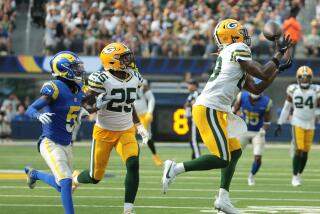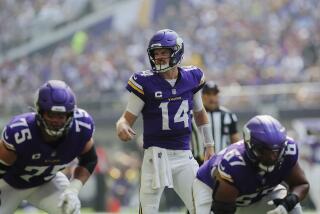Ex-Raider Brown Sees No Silver Lining
- Share via
Never mind winning a game, the Oakland Raiders have yet to score a touchdown this season. They have been outscored, 55-6, in losses to San Diego and Baltimore, and their decision to bring back Coach Art Shell now looks more like misguided desperation than some nostalgic stroke of genius.
If there’s a real Black Hole, it’s in the Raiders’ locker room and not in the McAfee Coliseum stands. Despite all the veterans in the locker room, none has stepped up to fill the leadership void. A franchise that has always embraced the philosophy of going deep is now discovering new depths by the week, although, mercifully, the Raiders are off this weekend.
Retired receiver Tim Brown, a nine-time Pro Bowl selection who was Mr. Raider for 16 seasons, was on the team during Shell’s first coaching go-round. He’s also familiar with coordinator Tom Walsh’s offense, which in two games has generated 129 and 162 yards.
Although he spent his final season with Jon Gruden in Tampa Bay, Brown retired a Raider and still keeps in touch with members of the team. To him, things are looking Silver & Bleak.
“I was on some bad teams there, but we were never devoid of leadership,” Brown said. “Be it me, be it Marcus Allen back in the day, be it Howie Long, be it whomever. We were never devoid of leadership. And I think right now the locker room is barren.
“I never played with Warren Sapp -- and I’m not necessarily hearing bad things about Warren Sapp -- but I’m not hearing, ‘He’s our guy,’ or, ‘He’s our leader.’ I’m not hearing that about anybody on the offensive line, I’m not hearing that about anyone whatsoever.
“So when you have a team where everyone’s just out playing -- and guys are playing hard, it looks like guys are out there flying around, so that doesn’t seem to be a problem -- but I think there’s a little division between Art and the team. And you have to have leadership in the locker room in order to close that division.”
Brown made an analogy to his own relationship with his father. He said it’s a good one largely because Tim’s older brother acted as a middleman.
“When I didn’t understand and I was thinking I’d do my own thing,” Brown recalled, “my big brother would say, ‘No, just listen to what he said, and just do it. Sooner or later you’re going to be able to do your own thing, but just do what he says first.’
“That’s sort of the same way with Art. When he says something, he wants it done his way. Well, if you’re that young brash kid, you’re thinking, ‘No, I want to do it my way.’ But they need that big brother who can say, ‘Hey, look, just do it his way, and believe me it’s going to work out.’ ”
Since reaching the Super Bowl in the 2002 season, the Raiders have gone 13-37 and burned through coaches Bill Callahan and Norv Turner. After last season, they rehired Shell, who was a respectable 56-41 in his first stint as coach, counting a 2-3 postseason record.
“Our time with Art back when he was a coach was absolutely great,” Brown said. “The only bad part was when the whole Marcus Allen deal came out and everybody was pretty much put in a position where you had to choose sides. But other than that, we had a great time.
“He would give these hard speeches. He’d start an 8 o’clock meeting on Saturday morning at 7:50, or whenever he came downstairs. Nobody thought it was fair, but guess what, we all started getting there at 7:45. We started doing the things the way he wanted them done. And what happened? We started winning games and making the playoffs and doing a lot of great things.”
But will the current situation work out the same way? Brown, for one, doesn’t think so, especially with the offense the Raiders are running. It’s one drawn up by Walsh, who was offensive coordinator of the Los Angeles Raiders in 1994 and, until he was hired in the spring, had been away from the NFL for 11 years. In the interim, he did a bit of coaching in college, owned a bed-and-breakfast in Idaho, and helped design football video games for Sega.
Those 1994 Raiders, the last of the franchise’s L.A. teams, were classic underachievers who had major penalty and clock-management problems. It remains to be seen if these Raiders will be as undisciplined, but the clock problems already are starting to surface.
“You just can’t run that offense in the NFL anymore,” said Brown, now living in Dallas, his hometown, and doing TV analyst work for Fox. “They’re calling timeouts, spending most of their timeouts, before 10 minutes is up in the second quarter. They’re getting delay penalties, getting to the line of scrimmage late, because those plays are 20 words long.
“I know that it was a horrible offense way back when. We just had to make plays and make things happen way back when. Being that the 40-second clock has come into play, and a lot of other rules have come into play since he was [last] in the league, I knew that would be a tough adjustment for him. Even zone blitzes and things of that nature. That makes that offense very tough. It was very one-dimensional, trying to audible was very difficult.”
Making matters worse, receiver Jerry Porter, among the Raiders’ most dangerous offensive weapons, is feuding with Shell and was deactivated for the first two games of the season. There’s no indication that standoff is ending.
Brown said Porter could and should be the receiver running those quick slants over the middle, routes Randy Moss doesn’t like running and 185-pound speedster Alvis Whitted is too small to run.
“Alvis Whitted will do anything they ask him to do,” Brown said. “It’s like they sent him over the middle the other day and almost got him decapitated. That’s not what Whitted should be doing, but he’s having to play Jerry Porter’s role. I think Jerry could make this offense look a little better, because he can get the ball out of the quarterback’s hands a little quicker with the routes that he can run.
“It’s tough to have a new offense, and even tougher to not be firing with all your bullets. And right now they’re not firing with all their bullets.”
But first things first. The way Brown sees it, the change has to come even before the team steps onto the field.
“Some kind of way, the organization has to raise up a leader in that locker room,” he said. “Because if Art is up there giving these great speeches, but everybody’s going to the locker room saying, ‘Man, what was that?’ then it doesn’t matter. It’s all for naught.”
More to Read
Go beyond the scoreboard
Get the latest on L.A.'s teams in the daily Sports Report newsletter.
You may occasionally receive promotional content from the Los Angeles Times.











